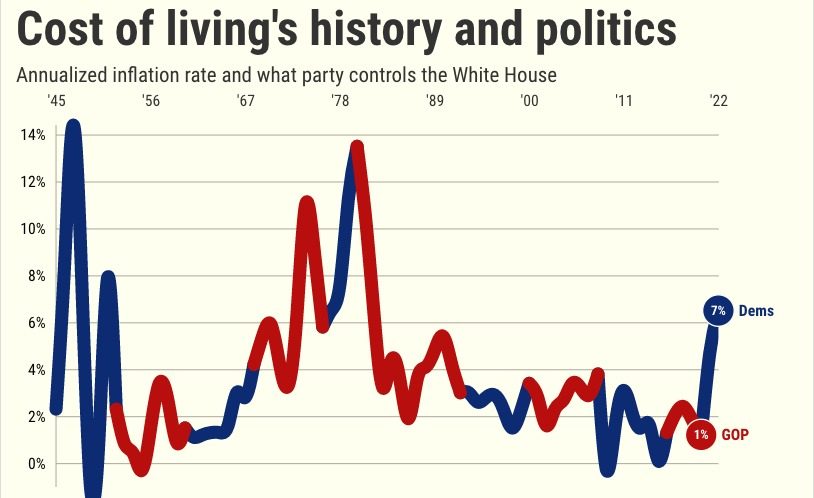
“Mailbag” offers insight into comments and emails I get from my readers — good, bad or in-between — and my thoughts about their feedback.
Inbox: Readers think I’m missing a big piece of the highest-in-four-decades inflation story: politics.
The feedback runs from “the real root cause of this hellish inflation is due to the policies of the Biden administration, Democrat party and their naive, gullible supporters” to “pretty big reason for inflation is not mentioned, “the current occupant of the White House,” to “lying Democrats raise the cost of everything far more than Republicans.”
My reply: It’s time for the trusty spreadsheet, even though I know, no matter what math I use, somebody will always complain!
To test my audience’s theory, I looked at inflation rates dating back to World War II and which party controlled the White House. I also staggered results by six months — so credit or blame for whatever happened in a presidential transition years was somewhat shared.
Let me note the president is just one force playing a role in the ever-changing cost of living. The inflation climate is determined by everything from foreign economic and political influences to worker-to-boss relationships and the rate-setting Federal Reserve.
The spreadsheet found that over nearly 80 years, inflation averaged 3.69% when Democrats were in command vs. 3.59% for Republicans. That’s not much difference, but we know politics is a “what have you done for me lately” business.
Looking at the cost of living when Democrats had the White House since 1944, inflation rose in four of five eras — from the year before Democrats gained power, to their last year in command.
For Republican presidents, inflation rose by the same metric in just two out of five periods of control.
Caveat
There is one flip side to inflation. It often moves in the opposite direction of unemployment, because you typically need lots of hiring to overheat prices.
During President Harry S. Truman’s terms in the White House from 1945-1952, inflation averaged 5.3% the third-highest among 10 presidential periods since World War II. Here, a 1951 file photo shows Truman giving his State of the Union address on Capitol Hill in Washington. (AP Photo/Byron Rollins, File)
So, let’s look at U.S. unemployment in this same post-WWII period, using the same math: With a Republican in the White House joblessness averaged 5.7%, slightly above the Democrats’ 5.6% rate.
Joblessness rose during all five periods of Republican control and just once under Democrats.
Bottom line
This math shows us that blaming the president — or their party — for inflation is reactionary and silly, no matter who’s in charge. The U.S. cost of living, in particular, is often heavily influenced by factors outside the reach of the world’s most powerful leader.
Yes, President Joe Biden — a Democrat — has seen inflation average 6.5% in the last 12 months vs. 1.3% in 2020 before he was elected. If this 5.2% jump represented Biden’s entire presidency, it would be topped only by Democrat Jimmy Carter’s 1977-80 days in the White House, dating back to World War II.
If that’s Biden’s fault, he should also get credit for unemployment falling from 8.1% in 2020 to a 4.6% average over the past 12 months. That 3.5-point drop was bested only by Democrat Bill Clinton’s 1993-2000 White House.
If you ignore politics altogether, the major risk these stats identify for 2022 is — the Fed.
The central bank’s twin chores include eyeballing inflation while monitoring the health of the job market. And with the cost of living skyrocketing at a pace not seen in four decades, the Central Bank is now pumping up interest rates it controls to cool demand for goods and services and hopefully slow inflation.
Can the Fed’s imposed chill be done deftly enough that it won’t cost millions of jobs?
And you tell me which is worse: Inflation chipping away at your paycheck or not having a paycheck at all?
Jonathan Lansner is the business columnist for the Southern California News Group. He can be reached at jlansner@scng.com
